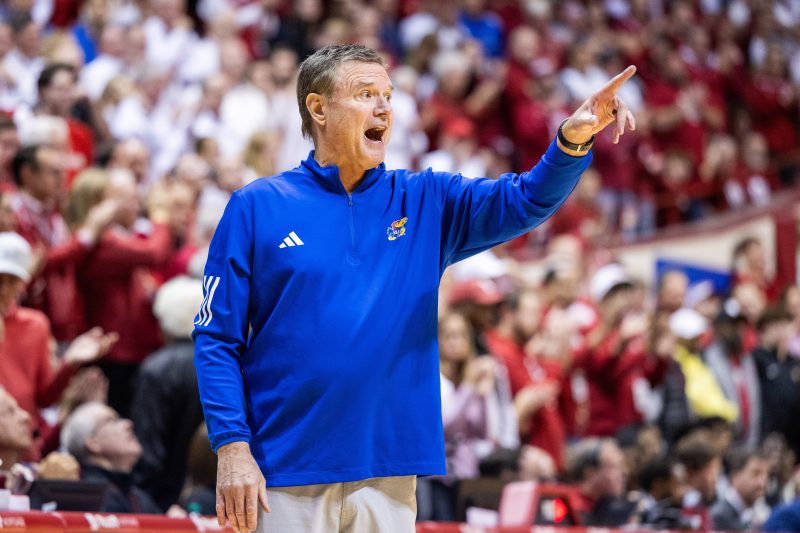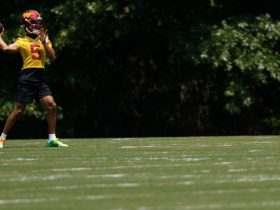For the second time in three years, Bill Self is the highest-paid men’s basketball coach in the country, according to USA TODAY Sports’ annual review of coaching compensation.
The Kansas head coach signed an amended contract last year that pushed his school pay, as calculated by USA TODAY Sports, to $9.45 million for the 2023-24 season − the highest one-year total for a public-school coach since the newspaper began tracking basketball coach compensation in 2007.
Included was a $1 million signing bonus that pushed Self’s school compensation past that of Kentucky coach John Calipari, who ranks second at $8.5 million. Self also earned nearly $172,000 in outside income, bringing his total pay for the year to $9.63 million.
‘The success of our men’s basketball program has served as a beacon for the University of Kansas for generations, profoundly impacting enrollment, increasing alumni engagement, and driving revenues that help fund other sports programs and department initiatives,’ Kansas athletics director Travis Goff told USA TODAY Sports in an email.
‘This contract is a direct reflection of those outcomes and Coach Self’s stature as a Hall of Fame coach and exceptional representative for the University of Kansas.’
IT’S BRACKET MADNESS: Enter USA TODAY’s NCAA tournament bracket contest for a chance at $1 million prize.
A breakdown of how much Self is being paid by Kansas this year:
What is Bill Self’s salary in 2023-24?
Self’s ‘base salary’ is technically $500,000 per year − but that’s just a tiny portion of the guaranteed money he is receiving from Kansas.
Self is pocketing a total of $6.7 million this season in professional services and royalty payments, which basically require him to participate in advertisements, speaking events and media appearances, among other ancillary activities. That combined amount will increase to $6.9 million next year, and then an average of $300,000 in each of the next three years after that − essentially giving him a built-in raise.
Kansas also spends $240,000 per year on Self’s membership to private jet charter company Wheels Up, among other perks. And then, of course, there are his retention bonuses.
Retention bonuses?
These payouts have been a staple of Self’s contracts for more than a decade. While the term ‘bonus’ is sometimes used to describe them, all Self has to do to earn them is stay employed at Kansas.
Under his new deal, which is automatically extended by one year at the end of each season, he automatically accrues a pro-rated $1 million per year, on top of his usual salary and benefits − which works out to $2,740 in what is essentially deferred income for every day he coaches the Jayhawks.
These retention bonuses can get complicated because, at least in Self’s case, they have been paid at different times than they are earned.
For example, Self is receiving money in his bank account this season in connection with two retention bonuses that he previously earned. And the aforementioned $1 million per year that he is currently earning will not actually hit his bank account until 2028 and 2029, or the day he leaves Kansas, whichever happens first. (USA TODAY Sports has avoided double-counting these amounts by including the money when he earns it, because his contract does not outline any instance or reasons why it would not ultimately be paid to him once earned.)
Goff wrote that the deferrals have helped Kansas manage its finances coming out of the COVID-19 pandemic and move forward with facilities updates, including to Allen Fieldhouse, where the men’s and women’s basketball teams play their games.
‘The department and Coach Self fully align on the notion that personnel investments should not preclude continued investment in other key priorities,’ Goff wrote.
What bonuses does Bill Self get?
On top of all the retention bonuses, Self can earn a cumulative amount of up to $800,000 if he or the team meet a list of nine benchmarks, based on academic or athletic performance.
The biggest payouts available to Self come with a national championship victory ($200,000) or Final Four appearance ($150,000), or if Self is named the Associated Press’ coach of the year ($100,000).
These bonus provisions are one of several ways in which Self’s contract differs from Calipari’s, which only has a single bonus for $50,000 tied to the team’s academic performance.
Will Bill Self be the highest-paid coach next year?
As of now, yes. Barring any dramatic changes in their respective contracts or outside income, Self will just squeak past Calipari again in 2024-25, with guaranteed compensation of roughly $8.6 million to Calipari’s $8.5 million.
Calipari, however, is then scheduled to receive a raise to $9 million for 2025-26, which would put him back on top.
Should all of that happen, it would mark nine consecutive seasons in which either Calipari or Self was the highest-paid public school coach in the country. The last time someone else topped USA TODAY Sports’ compensation rankings was 2016-17, when Rick Pitino led the list in his final year at Louisville.
Contact Tom Schad at tschad@usatoday.com or on social media @Tom_Schad and Steve Berkowitz at sberkowi@usatoday.com or @ByBerkowitz






